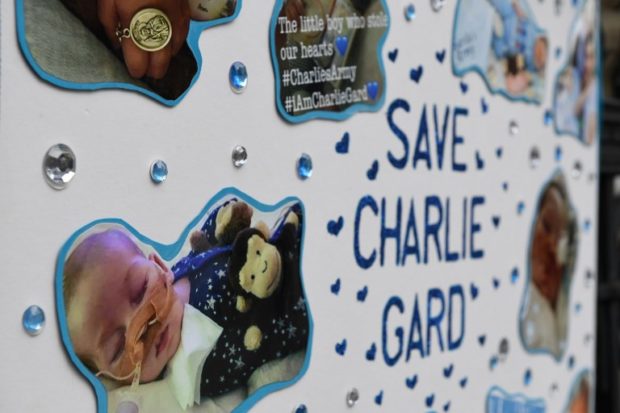
This file photo taken on July 24, 2017 shows
A picture shows a poster set up by supporters of the family of British baby Charlie Gard outside the Royal Courts of Justice in London ahead of a listed hearing in the case brought by Charlie’s parents to be allowed to take their son from hospital to the US for a possible treatment.
Charlie Gard, the terminally-ill British baby whose plight drew sympathy from Pope Francis and US President Donald Trump, has died, a family spokeswoman said July 27, 2017. Gard’s parents fought a lengthy legal battle to allow him to be taken to the United States for treatment for a rare genetic condition. He died a week short of his first birthday. AFP
LONDON—Charlie Gard, the terminally-ill British baby whose plight drew sympathy from Pope Francis and US President Donald Trump and sparked a debate about medical ethics, died on Friday, his mother said.
His parents, Connie Yates and Chris Gard, had fought a lengthy legal battle to allow him to be taken to the United States for treatment for a rare genetic condition.
But despite the international attention brought by his case, he died exactly one week short of his first birthday.
“Our beautiful little boy has gone. We are so proud of you, Charlie,” his mother Yates said in a statement.
A court had ordered that the 11-month-old should be moved from hospital to a hospice, where his life support was withdrawn.
READ: Baby can be allowed to die against parents’ wishes–judge
Supporters around the world donated £1.35 million ($1.75 million, 1.5 million euros) via an online fundraising site to support his parents and their efforts to keep their son alive, while 350,000 signed a petition demanding that he be allowed to receive experimental treatment in the US.
Following news of the boy’s death, Pope Francis, who supported the campaign, tweeted: “I entrust little Charlie to the Father and pray for his parents and all those who loved him.”
British Prime Minister Theresa May said she was “deeply saddened” by the death while US Vice President Mike Pence wrote he was: “Saddened to hear of the passing of Charlie Gard.”
Mitochondrial disease
Gard was born on August 4 last year with a rare form of mitochondrial disease that causes progressive muscle weakness, including in key organs such as the heart.
He was admitted to hospital at eight weeks old and his condition progressively deteriorated.
Gard’s parents fought a five-month legal battle for him to be taken to the United States for experimental treatment.
They lost a series of appeals in British courts and the European Court of Human Rights in Strasbourg.
Their campaign led to offers of help from the United States and the Vatican, leading the hospital to ask the courts for a final assessment of any new evidence.
On July 2, Pope Francis called for the couple to be allowed to “care for their child until the end”, saying he had followed the case with “affection and sadness”.
The following day, US President Donald Trump said in a tweet: “If we can help little Charlie Gard, as per our friends in the UK and the pope, we would be delighted to do so.”
But the boy’s parents gave up their battle last week, saying “time has run out”, after they were shown scans indicating that his condition had deteriorated too far.
“We are so sorry that we could not save you,” they said in an emotional statement at the High Court in London.
‘Agony’
Judge Nicholas Francis summed up the emotion involved in the case.
“It is impossible for any of us to comprehend or even begin to imagine the agony to which Charlie’s parents have been subjected in recent weeks and months as they have had to come to terms with the decision that they have now made,” he said in a judgement.
The parents then asked for Gard to be taken to their home for his final days but were overruled by the hospital which said the ventilator keeping him alive was too bulky to fit through their front door.
They finally agreed for him to be placed in a hospice.
Photographs of the baby dominated the front-pages of Britain’s Saturday newspapers, which paid tribute to a “beautiful little boy”.
The Daily Mail ran with the headline “Rest in Peace Carlie”, with the center-right publication saying the 11-month-old baby had “captured hearts around the world”.
It said the case has “raised so many questions about our age”.
The case triggered debate about whether parents or the state should have a final say on a child’s wellbeing and whether a child’s fate should be settled in a courtroom.
It provoked strong reactions, with an army of supporters shouting “shame on GOSH” following this week’s court hearing.
The hospital issued a statement Friday, saying: “Everyone at Great Ormond Street Hospital sends their heartfelt condolences to Charlie’s parents and loved ones at this very sad time.”

